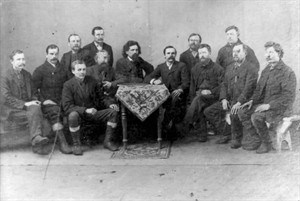
Leader Matti Kurikka, left centre, with beard, and members of the Kalevan Kansa pose in Sointula, B.C., in this undated photo. Most Finns are aware that back in 1901, there was a commune of anti-capitalist Finns in Canada. But what many didn't realize was that the place still exists and some of the people still living there are connected to the original commune, although most of the population lives non-commune lives. THE CANADIAN PRESS/HO
September 15, 2013 - 11:00 AM
VICTORIA - Mika Kaartinen is standing in his backyard in Masala, Finland, looking up at the night sky and musing out loud during an interview about the journey that will carry him thousands of kilometres to Canada to perform for the ancestors of the dreamers from his homeland who arrived on tiny Malcolm Island more than a century ago in search of their own paradise.
"It is really weird," says Kaartinen, 42, about the trip he and his 26-member theatre troupe are taking to the tiny community of Sointula — population 600 and located just off the northeast side of Vancouver Island — to perform their play "Sointula" on Sept. 21.
"We had a play about the story and the history of the ancestors of the people still living there," he said. "It's really a strange feeling to travel there to meet all the people and see the place. We had to take this chance because you don't get these kinds of chances normally."
"It's a once-in-a-lifetime when you do something this crazy."
Kaartinen said his troupe has been performing Sointula, in Finland for the past two summers. The play tells the ultimately tragic story about the charismatic, free-love-espousing, political rebel Matti Kurikka, who led the Kalevan Kansa commune in Sointula, which translates into place of harmony in Finnish.
Kaartinen said most Finns are aware that back in 1901, there was a commune of anti-capitalist Finns in Canada. But what many didn't realize was that the place still exists and some of the people still living there are connected to the original commune, although most of the population lives non-commune lives.
Kaartinen said when his theatre troupe received a letter from Sointula residents about 18 months ago inviting them to come to perform their play, the first response was shock, followed by enthusiasm.
He said the journey will come full circle on Sept. 21 in Sointula when his troupe performs "Sointula" for the last time in the community where it all began.
"Everything started in Sointula, and we have been living this life with Sointula for the last two or three years now, and this is the last time we will do the play, at the Finnish Organization Hall in Sointula — the right place to finish it all," said Kaartinen.
He said the troupe, who raised $50,000, to pay for their trip, had opportunities to stage the play in Nanaimo and Vancouver, but time constraints and their desire to bring the play home means only one performance in the 150-seat Sointula community hall.
"It's the end of one story, but I also believe it's also the start of something new," Kaartinen said. "We don't know what's going to happen, but something will start from there."
The current residents of Sointula, who now make their living fishing, logging, farming and in the arts, have embraced the appearance of the Finnish theatre troupe and turned the show into a three-day gathering that examines utopian life choices, past and present.
Culture Shock: Utopian Dreams, Hard Realities is bringing academics and amateur deep thinkers to Sointula for a series of lectures and events that examine the Sointula utopian dream, which at one point had about 200 people, but collapsed in 1903 after a fire killed 11 people, eight of them children.
Experts will also discuss other utopian communities in nearby Washington State, while others will examine the recent Occupy movement and its similarities to utopian ideals.
Religion Prof. Ed Dutton, who teaches at Oulu University in Finland, will deliver a lecture that connects the birth of the term "culture shock" to Sointula and the Canadian academic who spent his early years living in Sointula.
Dutton says Canadian anthropologist Kalvero Oberg, who was raised in Sointula and lost two sisters in the 1903 fire, is the father of the culture shock theory. His 1950s theory examined the stages people go through when expatriates are exposed to a new culture.
Sointula resident Annemarie Koch says Sointula has never lost its utopian roots and quickly viewed the opportunity to stage the Finnish play in their community hall as an opportunity to conduct a modern-day history lesson.
She said about 30 per cent of Sointula residents hold connections to the original commune.
"The people of this community didn't give up, and there's a Finnish word for that, which is 'sisu,' the word they use for what we call tenacity or perseverance, and some might call stubbornness."
Koch said tickets for the conference and play are sold out.
News from © The Canadian Press, 2013